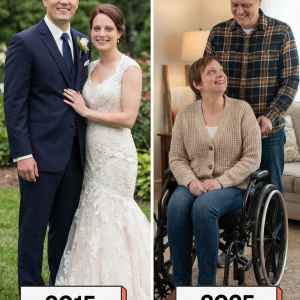Growing up, my sister Stephanie and I looked like the picture-perfect siblings—at least from the outside. But under that surface was a much more complicated story. Four years younger, Stephanie was coddled as the family favorite, while I—Scarlet—was expected to lead, sacrifice, and succeed without complaint.
While I broke my back earning straight A’s and grinding through college on a full scholarship, Stephanie could flunk a test and still be called “misunderstood.” Mom always reminded me: “You’re the older sister—set an example.” And so I did. I excelled. I built a life through sleepless nights at a tech startup, coding until dawn. By 28, I had a bank account big enough to retire.
Just as my world was blooming, my parents’ was falling apart. Their store—the one that funded our childhoods—was going under. I sent money quietly, through trusts and shell companies, preserving their pride and hiding my success from Stephanie. I even created a fake scholarship to fund her lavish college life—luxury apartment and all.
Mark, my fiancé, met Stephanie during Thanksgiving. She was charming—too charming. Laughing at his jokes, touching his arm, oversharing her “single” status. But Mark didn’t notice. He saw only good in people.
Stephanie, despite her failing grades and job-hopping, kept living large—all funded by me. When she overdrew her account, Mom called me, worried. I always played the part: the helpful daughter, never letting them see how much I truly gave.
Our wedding planning began, and Stephanie, my maid of honor, slowly unravelled the plans. “Lost” checks. Missed bookings. Then a diary I found in our parents’ attic confirmed my darkest suspicion. She planned to fake a pregnancy, steal the spotlight, and sabotage the ceremony.
The final straw came at our rehearsal dinner. She rubbed her stomach theatrically, speaking just loud enough for guests to overhear that she was “pregnant.” When she stepped away from the table, her unlocked phone lit up. I found messages to a friend—proof of the fraud. I took photos, returned her phone, and waited.
As she made her dramatic “announcement,” I stood calmly. I called her out. I exposed the fake texts. Her lies unraveled in front of a horrified room.
Then I revealed the real truth.
I told everyone: I had been their hidden benefactor. I funded the house, the store, her tuition. I laid the evidence on the table, my quiet sacrifices exposed like battle scars. The gasps were real. My father’s face drained of color. My mother sank into her seat. Stephanie’s smugness dissolved into something almost childlike—shock, guilt, maybe even shame.
That night, I walked away—not just from the dinner, but from the exhausting role I’d played for years.
A week later, my family asked for a meeting. I told them everything—the startup, the money, the reason I never told them: I didn’t want to be their bank while still being their second choice.
Stephanie admitted the pregnancy was a lie. She also confessed something worse: she’d contacted Mark’s ex, hoping she’d crash the wedding. She had been trying to win him over since our engagement.
But then, something unexpected happened—Stephanie cracked. She admitted her jealousy, her failures, her resentment of being the “favorite” with nothing to show for it. For the first time, I saw her not as my enemy, but a reflection of a broken family dynamic. We were both victims of expectations—just on opposite ends.
I cut off the financial support. Not out of cruelty—but to force us all to reset. The wedding was postponed. They had two months to figure things out. And for the first time, they did.
My parents downsized, got jobs, and found honest footing. Stephanie got promoted, went back to school, and moved into an apartment she paid for. She was finally building a life with her own hands.
Six months later, I married Mark on a beach with only close friends and family. Stephanie sat quietly in the second row, smiling—genuinely, not to perform.
At the reception, she handed me an envelope—her business plan for a graphic design startup. “Not asking for money,” she said. “Just your opinion.” For the first time, she saw me as a partner, not a rival.
Her toast surprised everyone. She stood up, voice trembling, and spoke with a humility I had never heard before. “Scarlet,” she said, “I’ve spent most of my life resenting your light. But now I see—I can shine too.”
Later, my father whispered to me, “I suspected it was you all along. I just didn’t want to admit how much I relied on you.”
“We all made mistakes,” I told him. “But we’re learning.”
And we were.
On our honeymoon, I looked back at it all. The fake pregnancy. The betrayals. The exposed secrets. It hadn’t destroyed us. It forced us to face our truths.
Because real love—real family—doesn’t come from money or lies. It comes from honesty. And the courage to stop protecting each other from the truth long enough to start healing from it.





